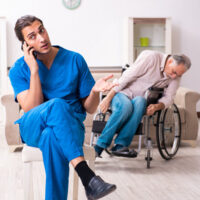Signs Of Elder Abuse To Remember

Last year, at the height of the COVID-19 pandemic, nursing homes and assisted living centers were at the epicenter of death and illness. Only recently are nursing homes open to the public and to visits from loved ones. Many nursing home staff members were required to stay on campus to limit exposure to the virus and risk to residents, but not all staff listened. In the meantime, family members who would usually visit on a weekly or more frequent basis with their loved ones were cut off from contact, and nursing home residents were isolated, scared and lonely. Family members felt powerless and were rightfully concerned about their loved one’s welfare. If you do suspect elder abuse, what are some signs you should look for?
Signs of Neglect
If your elderly loved one is being physically neglected, their health might begin to rapidly decline. They might seem withdrawn, anxious, or listless. Physical manifestations of neglect might occur, such as bed sores, increased rate of infection, urinary infections, dietary issues, rapid weight loss, or respiratory issues. Remaining in the same position in bed or lying down for too long can cause blood clots to form and contribute to deep vein thrombosis, putting loved ones at risk for a stroke. Lack of physical activity is detrimental to physical, mental and emotional health. Just because your loved one is not as mobile as they once were doesn’t mean nursing home staff can’t assist them in and out of bed and with daily tasks. Another sign of elder abuse is a decline in personal hygiene. Some residents might need help with personal care, showering, brushing teeth or hair and other hygienic needs. If you notice your loved one is visibly dirty or sick, that is a clear sign that neglect is ongoing and that you need to intervene.
Signs of Emotional & Financial Abuse
If your elderly loved one is the target of emotional abuse, they might seem nervous, sad, depressed, or even angry. While it is inherently wrong, some staff members that care for the elderly and vulnerable populations take advantage of their position and are verbally or emotionally abusive to the residents they care for, spouting expletives, making hurtful comments, or simply ignoring residents. Your loved one doesn’t deserve that kind of treatment; no one does. In addition, it is not uncommon for elderly loved ones to be taken advantage of financially as well. Sometimes staff will steal personal items and effects or even attempt to usurp money, intercept social security checks or funds from loved ones, or engage in elderly identity theft. Elderly populations are also uniquely susceptible to financial abuse and scams on the internet and by telemarketers. As the loved one of an elderly family member, it is crucial you remain vigilant, ask questions and do everything you can to protect your loved one. If you suspect any form of abuse, contact the Millhorn Elder Law Planning Group for assistance.
Call Millhorn Elder Law Planning Group
Estate planning attorney Eric Millhorn and his staff have experience in elder law and financial planning for residents in The Villages. He understands the sensitive nature of elder law and end-of life planning, including the difficult reality of elder abuse. We hold our loved ones and elders in esteem and want only the best for them. We put our faith and trust into assisted living and nursing home facilities to provide the utmost care and assistance. When our trust is violated and our loved ones are hurting, we are entitled to answers and justice. If you suspect your loved one is being abused or is an unsafe environment, contact the Millhorn Elder Law Planning Group for help.
Source:
floridahealthcovid19.gov/nursing-homes/
